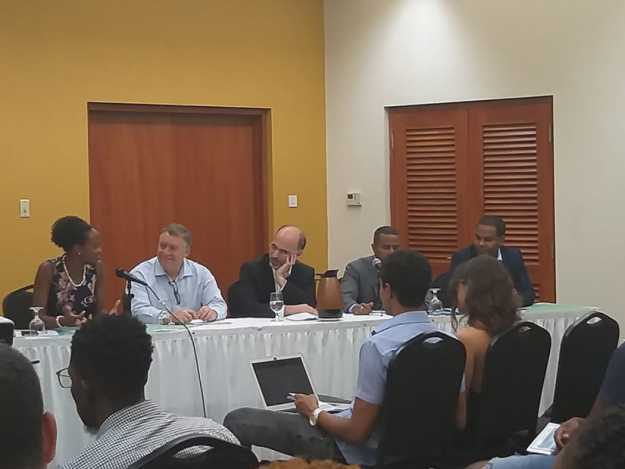BRIDGETOWN, Barbados – February 7, 2020 – Trade liberalisation is important, but not a panacea for the Latin America and Caribbean (LAC) region. That was the strong message coming out of a panel discussion jointly hosted by the Shridath Ramphal Centre for International Trade Law, Policy and Services (SRC) of The University of the West Indies, Cave Hill (The UWI Cave Hill) andthe Inter-American Development Bank (IDB). The panel discussion took place on Thursday, February 6, 2020 at 6:00 pm at the Sagicor Cave Hill School of Business and Management and carried the same name as the IDB’s 2019 flagship Report on which it was based: “Trading Promises for Results: What Global Integration can do for Latin America and The Caribbean”.
In his welcome remarks, SRC Director, Neil Paul, expressed the SRC’s delight in partnering with IDB on this event, noting the intersecting areas of focus of the two institutions, including trade training, research and capacity building. In highlighting the Caribbean’s “disappointing” performance in trade over the past few years, Director Paul noted the anticipation of the audience – largely comprising students and faculty of The UWI, as well as members of the general public – in hearing from the esteemed speakers on whether the promised benefits of trade liberalization for the region had translated into meaningful results.
The discussion, which was chaired by SRC Deputy Director, Dr. Jan Yves Remy, began with a presentation by the Report’s two editors Dr. Mauricio Mesquita Moreira (Principal Economic Advisor, IDB Integration and Trade Sector) and Dr. Ernesto Stein (Principal Technical Leader, IDB Research Department). They summarized the report’s major takeaways including that trade liberalization has led to an increase in welfare and economic growth in the LAC region but has not necessarily decreased employment and inequality. LAC governments, they said, needed to implement sound policies that complemented trade ones such as labour adjustment and productivity development programmes. This might help the losers from trade to realise gains.
The two discussants – Dr. Justin Ram, Director of Economics of the Caribbean Development Bank (CDB) and Dr. Antonio Alleyne, Temporary Lecturer in the Department of Economics of The UWI, Cave Hill – provided spirited responses to the Report. Dr. Ram applauded its inclusion of political economy considerations, in particular the recommendations for mechanisms to trade adjustment. He implored CARICOM policy makers to not only couch trade in a comprehensive development policy, but to use the single economic space for enabling the free movement of labour and capital. While lauding the effort of the authors in presenting comprehensively the Latin American experience, Dr. Alleyne highlighted the lack of data specific to the Caribbean region. The unfortunate result was that the Caribbean policy-maker could not use the Report to provide a ‘holistic’ picture for formulating and implementing reforms resulting from the dislocations from trade liberalisation.
A short and lively discussion with the audience concluded the evening.


